On this Day in History ... 24th February
24 Feb is in February.
616 Death of Æthelberht King of Kent
1503 Funeral of Elizabeth of York Queen Consort
Events on the 24th February
On 24 Feb 616 King Æthelberht of Kent (age 66) died. His son King Eadbald of Kent succeeded King of Kent. Emma Austrasia Queen Consort Kent by marriage Queen Consort Kent.
John of Fordun's Chronicle. On the 27th of July 1302, [Note. The date here confusing since the Battle of Roslyn] is reported to have taken place on 24 Feb 1303] took place the great and famous engagement between the Scots and English, at Roslyn [Map], where the English were defeated, though with great difficulty. From the beginning of the first war which ever broke out between the Scots and English, it is said, there never was so desperate a struggle, or one in which the stoutness of knightly prowess shone forth so brightly. The commander and leader in this struggle was John Comyn (age 33), the son. Now this was how this struggle came about, and the manner thereof. After the battle fought at Falkirk, the king of England (age 63) came not in person, for the nonce, this side of the water of Forth; but sent a good large force, which plundered the whole land of Fife, with all the lands lying near the town of Perth [Map], after having killed a great many of the dwellers in those lands. On the return of this force, with countless spoils, that king (age 63) hied him home again with his host. Now this was brought about, doubtless, by God's agency: for had he made a lengthened stay then, or after the battle of Dunbar and the seizure of King John (age 53), he would either have subjugated the whole land of Scotland, and the dwellers therein, to his sway, or made it a waste with naught but floods and stones. But the goodness of God, Who alone tends and heals after wounds, so governed the actions and time of that king, that, being stirred up to battle, and engrossed with sundry wars, he could not put off all other matters, and give himself up to subduing this kingdom. So that king of England (age 63) went back with his men, having first appointed the officers of the sheriffdoms, and the wardens of the castles, in the districts beyond the water of Forth, which were then fully and wholly subject unto his sway - with the exception of a few outlaws (or, indeed, robbers), of Scottish birth, who were lurking in the woods, and could not, because of their misdeeds, submit to the laws. But John Comyn (age 33), then guardian of Scotland, and Simon Eraser, with their followers, day and night did their best to harass and annoy, by their great prowess, the aforesaid king's officers and bailiffs; and from the time of that king's departure, for four years and more, the English and the Anglicized Scots were harried by them, in manifold ways, by mutual slaughter and carnage, according to the issue of various wars.
John of Fordun's Chronicle. 24 Feb 1303. When the aforesaid king (age 63) had got news of this, he sent off a certain nobleman, Ralph Confrere, his treasurer (Ralph de Manton, the Cofferer), a man stout in battle, and of tried judgment and wisdom, with a certain body of chosen knights, thoroughly well-armed, to seek out, in every hole and corner, those who troubled and disturbed the king's peace, and not to forbear punishing them with the penalty of death. So they entered Scotland, and went about ranging through the land, until they, at Roslyn, pitched their tents, split up into three lines apart, for want of free camping room. But the aforesaid John Comyn (age 34) and Simon, with their abettors, hearing of their arrival, and wishing to steal a march rather than have one stolen upon them, came briskly through from Biggar to Eoslyn, in one night, with some chosen men, who chose rather death before unworthy subjection to the English nation; and, all of a sudden, they fearlessly fell upon the enemy. But having been, a little before, roused by the sentries, all those of the first line seized their weapons, and manfully withstood the attacking foe. At length, however, the former were overcome. Some were taken, and some slain; while some, again, fled to the other line. But, while the Scots were sharing the booty, another line straightway appeared, in battle-array; so the Scots, on seeing it, slaughtered their prisoners, and armed their own vassals with the spoils of the slain; then, putting away their jaded horses, and taking stronger ones, they fearlessly hastened to the fray. When this second line had been, at length, overcome, though with difficulty, and the Scots thought they had ended their task, there appeared a third, mightier than the former, and more choice in their harness. The Scots were thunderstruck at the sight of them; and being both fagged out in manifold ways, - by the fatigues of travelling, watching, and want of food - and also sore distressed by the endless toil of fighting, began to be weary, and to quail in spirit, beyond belief. But, when the people were thus thrown into bewilderment, the aforesaid John and Simon, with, hearts undismayed, took up, with their weapons, the office of preachers; and, comforting them with their words, cheering them with their promises, and, moreover, reminding them of the nobleness of freedom, and the baseness of thraldom, and of the unwearied toil which their ancestors had willingly undertaken for the deliverance of their country, they, with healthful warnings, heartened them to the fray. So, being greatly emboldened by these and such-like words, the Scots laid aside all cowardice, and got back their strength. Then they slaughtered their prisoners, with whose horses and arms they were again - as it were - renewed; and, putting their trust in God, they and their armed vassals marched forward most bravely and dashingly to battle. The shock was so mighty and fierce, that many were run through, and bereft of life; and some of either host, after awful spear-thrusts, savage flail-strokes, and hard cudgelling, withdrew from the ranks, by hundreds, forties, and twenties, to the hills, time after time, fagged out and dazed by the day's fighting. There they would throw back their helmets, and let the winds blow upon them; and after having been thus cooled by the breeze, they would put away their wounded horses, and, mounting other fresh ones, would thus be made stronger against the onslaughts of the foe. So, after this manifold ordeal and awful struggle, the Scots, who, if one looked at the opposite side, were very few in number - as it were a handful of corn or flour compared with the multitude of the sea-sand - by the power, not of man, but of God, subdued their foes, and gained a happy and gladsome victory.
On 24 Feb 1303 at Roslyn a Scottish force commanded by Simon Fraser and John Comyn 3rd Lord Baddenoch (age 34) ambushed the English army led by John Segrave 2nd Baron Segrave (age 47) who was captured and subsequently released.
On 24 Feb 1500 Charles V Holy Roman Emperor was born to Philip "Handsome Fair" King Castile (age 21) and Joanna "The Mad" Trastámara Queen Castile (age 21) at Ghent [Map]. Coefficient of inbreeding 2.88%. 
On 24 Feb 1503 Elizabeth York Queen Consort England (deceased) was buried in the King Henry VII Chapel, Westminster Abbey [Map]. Her sister Catherine York Countess Devon (age 23) chief mourner.
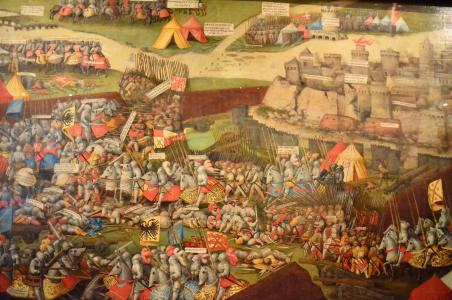 On 24 Feb 1525 Richard Pole "White Rose" 5th Earl of Suffolk (age 45) was killed during the Battle of Pavia. Robert Stewart 4th Lord Aubigny (age 55) fought.
On 24 Feb 1525 Richard Pole "White Rose" 5th Earl of Suffolk (age 45) was killed during the Battle of Pavia. Robert Stewart 4th Lord Aubigny (age 55) fought.

Louis II de la Tremoille (age 64) was killed.
Unknown Painter. Battle of Pavia with the fallen Richard Pole "White Rose" 5th Earl of Suffolk (age 45) bottom left corner indicated by "Le Duc de Susfoc dit Blance Rose".
Robert Stewart 4th Lord Aubigny:
Robert Stewart 4th Lord Aubigny succeeded 4th Lord Aubigny.
Robert Stewart 4th Lord Aubigny and Anne Stewart Lady Aubigny were married. She by marriage Lord Aubigny. He the son of John Stewart 1st Earl Lennox and Margaret Montgomerie Countess Lennox. They were second cousins. Around 1470 he was born to John Stewart 1st Earl Lennox and Margaret Montgomerie Countess Lennox.
Around Apr 1544 Robert Stewart 4th Lord Aubigny died.
Around 1470 he was born to John Stewart 1st Earl Lennox and Margaret Montgomerie Countess Lennox.
Around Apr 1544 Robert Stewart 4th Lord Aubigny died.
Louis II de la Tremoille: On 29 Sep 1460 he was born to Louis I de la Tremoille.
Letters and Papers 1533. 24 Feb 1533. Granvelle, Papiers d'Etat, II. 1. 182. Clement VII. and Charles V.
Treaty for defence against the Turk, with a clause that if the Pope treat for the marriage of Katharine de Medici with a son of Francis I. he shall take security that France shall assist in a council for religion and defence against the Turks. Also a clause touching duke Alexander; and another that the English divorce be not tried anywhere but at Rome, but that the Pope shall give no countenance to the king of England's relations with Anne Boleyn (age 32), but shall act upon the brief he lately issued. Bologna, 24 Feb. 1533. Lat.
Henry Machyn's Diary. 24 Feb 1554. The sam day the qwyn('s) (age 38) grace gaff pardon unto serten of mo men of Kentt, in Sowthwarke [Map]; ther they cryd "God save quen Mare!" and cast ther alters on hed in the stretes and a-bowt, that sum had iiij or v halters.
Henry Machyn's Diary. 24 Feb 1554. The xxiiij day of Marche [read xxiij of February] was heddyd the duke of Suffoke-Dassett (deceased) [Dassett ie Dorset] on the Towre hylle [Map], be-twyn ix and x of the cloke a-for none.
On 24 Feb 1557 Matthias I Holy Roman Emperor was born to Maximilian Habsburg Spain II Holy Roman Emperor (age 29) and Maria of Spain Holy Roman Empress (age 28). Coefficient of inbreeding 10.03%.
On 24 Feb 1558 Ferdinand I Holy Roman Emperor (age 54) succeeded I Holy Roman Emperor. Anne Jagiellon Holy Roman Empress by marriage Holy Roman Empress.
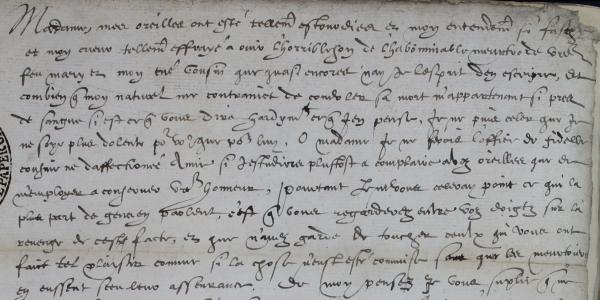 On 24 Feb 1567 Queen Elizabeth I of England and Ireland (age 33) wrote to her cousin Mary Queen of Scots (age 24) regarding the murder of Mary's husband Henry "Lord Darnley" Stewart (deceased) as follows:
On 24 Feb 1567 Queen Elizabeth I of England and Ireland (age 33) wrote to her cousin Mary Queen of Scots (age 24) regarding the murder of Mary's husband Henry "Lord Darnley" Stewart (deceased) as follows:


Madam (age 24),
My ears have been so astounded and my heart so frightened to hear of the horrible and abominable murder of your husband (deceased) and my own cousin that I have scarcely spirit to write: yet I cannot conceal that I grieve more for you than him. I should not do the office of a faithful cousin and friend, if I did not urge you to preserve your honour, rather than look through your fingers at revenge on those who have done you that pleasure as most people say. I counsel you so to take this matter to heart, that you may show the world what a noble Princess and loyal woman you are. I write thus vehemently not that I doubt, but for affection. [Translated from the French; extract - lines 1-12]
On 24 Feb 1588. Elizabethan Period monument to John Manners 4th Earl of Rutland (age 37) and Elizabeth Charlton Countess Rutland (age 35) in the Chancel of St Mary the Virgin Church, Bottesford, Leicestershire [Map] sculpted by Gerard Johnson The Elder (age 38).
John Manners 4th Earl of Rutland:
Around 1551 he was born to Henry Manners 2nd Earl of Rutland and Margaret Neville Countess Rutland.
Before 1572 John Manners 4th Earl of Rutland and Elizabeth Charlton Countess Rutland were married. He the son of Henry Manners 2nd Earl of Rutland and Margaret Neville Countess Rutland.
On 14 Apr 1587 Edward Manners 3rd Earl of Rutland died at his home Ivy Bridge on the Strand or at Puddle Wharf aka Dock. He was buried at St Mary the Virgin Church, Bottesford, Leicestershire. His daughter Elizabeth Manners 15th Baroness Ros of Helmsley succeeded 15th Baroness Ros Helmsley. His brother John Manners 4th Earl of Rutland succeeded 4th Earl of Rutland. Elizabeth Charlton Countess Rutland by marriage Countess of Rutland. He would be Earl for ten months only dying on 24 Feb 1588. On 24 Feb 1588 John Manners 4th Earl of Rutland died. His son Roger Manners 5th Earl of Rutland succeeded 5th Earl of Rutland.
On 24 Feb 1588 John Manners 4th Earl of Rutland died. His son Roger Manners 5th Earl of Rutland succeeded 5th Earl of Rutland.
Elizabeth Charlton Countess Rutland: In 1553 she was born to Francis Charlton of Apsley Castle in Shropshire and Cecily Fitton. Around 21 Mar 1595 she died. She was buried at St Mary the Virgin Church, Bottesford, Leicestershire.
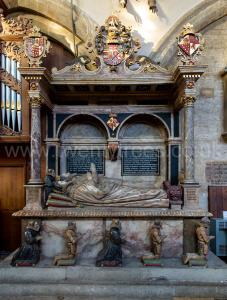
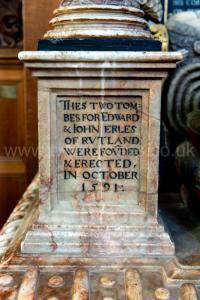
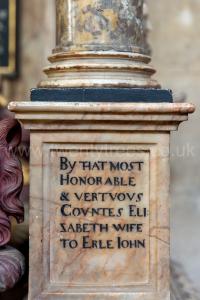
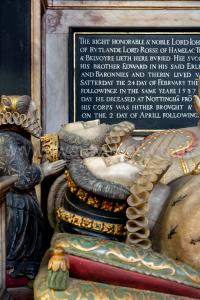
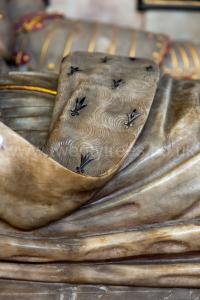
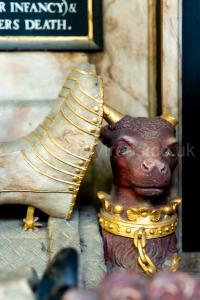
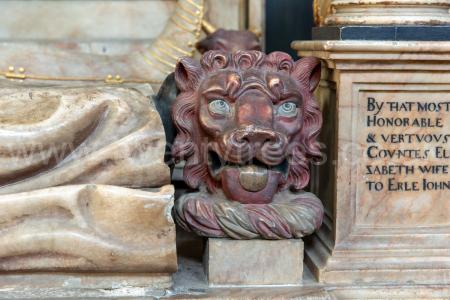
Detail of the Bulls Head with a chained coronet around its neck on which his feet rest, and the Lion on which her feet rest.
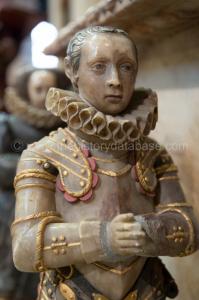
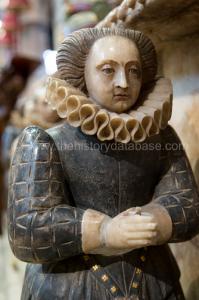
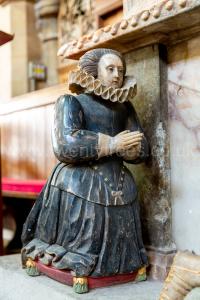
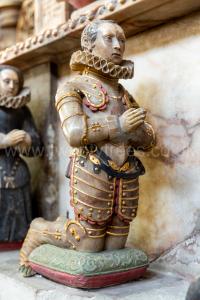
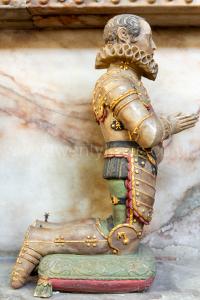
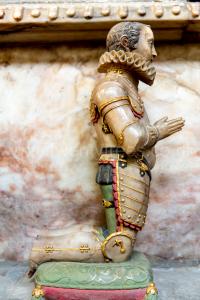
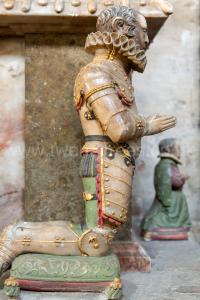
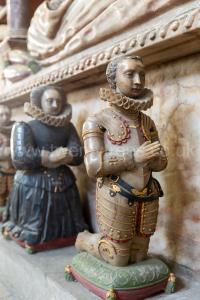
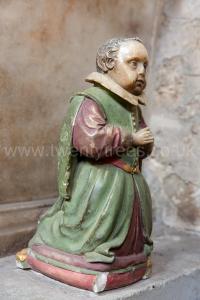
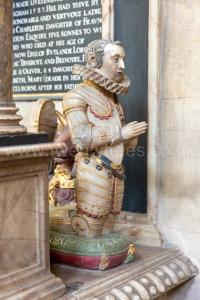
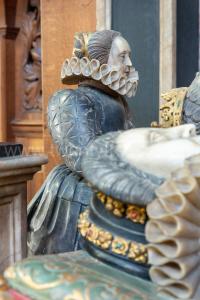
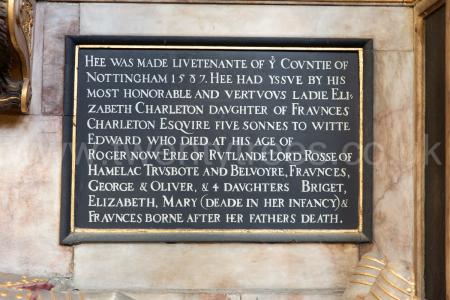
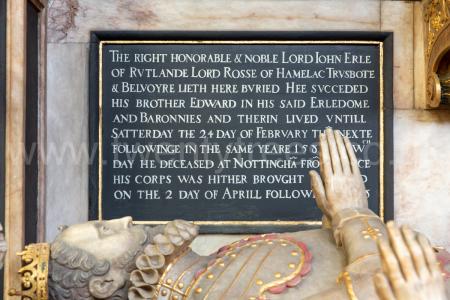
Detail of the Biographical panels.
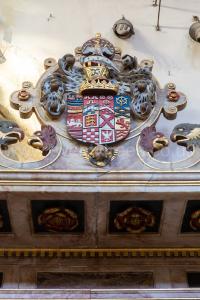
Armorial above the monument showing top row:  Manners Augmented Arms,
Manners Augmented Arms,  Ros Arms,
Ros Arms,  Roet Arms, Trusbutt [or Belvoir],
Roet Arms, Trusbutt [or Belvoir],
2nd Row:  Beauchamp Arms,
Beauchamp Arms,  Beaumont Arms,
Beaumont Arms,  Berkeley Arms,
Berkeley Arms,  Lisle Arms
Lisle Arms
3rd Row: Unknown,  Thomas Holland 2nd Earl Kent 1350 1397 Arms,
Thomas Holland 2nd Earl Kent 1350 1397 Arms,  Tiptoft Arms,
Tiptoft Arms,  Powys Arms aka Charlton
Powys Arms aka Charlton
4th Row:  Badlesmere Arms,
Badlesmere Arms,  Vaux Arms, Todeni [Albini ancient] Arms,
Vaux Arms, Todeni [Albini ancient] Arms,  Daubeney Arms.
Daubeney Arms.
On 24 Feb 1593 Henry de Vere 18th Earl of Oxford was born to Edward de Vere 17th Earl of Oxford (age 42) and Elizabeth Trentham Maid of Honour Countess of Oxford.
On 24 Feb 1605 Henry Howard 1st Earl of Northampton (age 64) was appointed 400th Knight of the Garter by King James I of England and Ireland and VI of Scotland (age 38).
Memoirs of Jean Francois Paul de Gondi Cardinal de Retz Book 1. The 24th of February, 1649, the Parliament's deputies waited on the Queen (age 10) with an account of the audience granted to the envoy of the Archduke. The Queen (age 10) told them that they should not have given audience to the envoy, but that, seeing they had done it, it was absolutely necessary to think of a good peace, that she was entirely well disposed; and the Duc d'Orléans and the Prince de Conde promised the deputies to throw open all the passages as soon as the Parliament should name commissioners for the treaty.
Flamarin being sent at the same time into the city from the Duc d'Orléans to condole with the Queen of England (age 39) on the death of her husband (deceased) (King Charles I.), went, at La Riviere's solicitation, to M. de La Rochefoucault, whom he found in his bed on account of his wounds and quite wearied with the civil war, and persuaded him to come over to the Court interest. He told Flamarin that he had been drawn into this war much against his inclinations, and that, had he returned from Poitou two months before the siege of Paris, he would have prevented Madame de Longueville engaging in so vile a cause, but that I had taken the opportunity of his absence to engage both her and the Prince de Conti, that he found the engagements too far advanced to be possibly dissolved, that the diabolical Coadjutor would not bear of any terms of peace, and also stopped the ears of the Prince de Conti and Madame de Longueville, and that he himself could not act as he would because of his bad state of health. I was informed of Flamarin's negotiations for the Court interest, and, as the term of his passport had expired, ordered the 'prevot des marchands' to command him to depart from the city.

Evelyn's Diary. 24 Feb 1664. My Lord George Berkeley (age 36), of Durdans, and Sir Samuel Tuke (age 49) came to visit me. We went on board Sir William Petty's (age 40) double-bottomed vessel, and so to London.
Pepy's Diary. 24 Feb 1666. All the morning at the office till past three o'clock. At that houre home and eat a bit alone, my wife being gone out. So abroad by coach with Mr. Hill (age 36), who staid for me to speake about business, and he and I to Hales's (age 66), where I find my wife and her woman, and Pierce and Knipp, and there sung and was mighty merry, and I joyed myself in it; but vexed at first to find my wife's picture not so like as I expected; but it was only his having finished one part, and not another, of the face; but, before I went, I was satisfied it will be an excellent picture. Here we had ale and cakes and mighty merry, and sung my song, which she [Knipp] now sings bravely, and makes me proud of myself.
Pepy's Diary. 24 Feb 1667. By and by comes Sir Robert Viner (age 36) and my Lord Mayor to ask the King's directions about measuring out the streets according to the new Act for building of the City, wherein the King (age 36) is to be pleased1. But he says that the way proposed in Parliament, by Colonel Birch (age 51), would have been the best, to have chosen some persons in trust, and sold the whole ground, and let it be sold again by them, with preference to the old owner, which would have certainly caused the City to be built where these Trustees pleased; whereas now, great differences will be, and the streets built by fits, and not entire till all differences be decided. This, as he tells it, I think would have been the best way. I enquired about the Frenchman2 that was said to fire the City, and was hanged for it, by his own confession, that he was hired for it by a Frenchman of Roane, and that he did with a stick reach in a fire-ball in at a window of the house: whereas the master of the house, who is the King's baker, and his son, and daughter, do all swear there was no such window, and that the fire did not begin thereabouts. Yet the fellow, who, though a mopish besotted fellow, did not speak like a madman, did swear that he did fire it: and did not this like a madman; for, being tried on purpose, and landed with his keeper at the Tower Wharfe [Map], he could carry the keeper to the very house. Asking Sir R. Viner (age 36) what he thought was the cause of the fire, he tells me, that the baker, son, and his daughter, did all swear again and again, that their oven was drawn by ten o'clock at night; that, having occasion to light a candle about twelve, there was not so much fire in the bakehouse as to light a match for a candle, so that they were fain to go into another place to light it; that about two in the morning they felt themselves almost choked with smoke, and rising, did find the fire coming upstairs; so they rose to save themselves; but that, at that time, the bavins3 were not on fire in the yard. So that they are, as they swear, in absolute ignorance how this fire should come; which is a strange thing, that so horrid an effect should have so mean and uncertain a beginning.
Note 1. See Sir Christopher Wren's (age 43) "Proposals for rebuilding the City of London after the great fire, with an engraved Plan of the principal Streets and Public Buildings", in Elmes's "Memoirs of Sir Christopher Wren", Appendix, p.61. The originals are in All Souls' College Library, Oxford. B.
Note 2. "One Hubert, a French papist, was seized in Essex, as he was getting out of the way in great confusion. He confessed he had begun the fire, and persisted in his confession to his death, for he was hanged upon no other evidence but that of his own confession. It is true he gave so broken an account of the whole matter that he was thought mad. Yet he was blindfolded, and carried to several places of the city, and then his eyes being opened, he was asked if that was the place, and he being carried to wrong places, after he looked round about for some time, he said that was not the place, but when he was brought to the place where it first broke out, he affirmed that was the true place. "Burnet's Own Time", book ii. Archbishop Tillotson (age 36), according to Burnet, believed that London was burnt by design.
Note 3. brushwood, or faggots used for lighting fires.
Evelyn's Diary. 24 Feb 1695. I saw the Queen lie in state.
On 24 Feb 1699 Joseph I Holy Roman Emperor (age 20) and Wilhelmine Amalie of Brunswick (age 25) were married. He the son of Leopold Habsburg Spain I Holy Roman Emperor (age 58) and Eleonore Magdalene of Neuburg (age 44). She a great x 2 granddaughter of King James I of England and Ireland and VI of Scotland. 

The 1715 Battle of Preston was the final action of the 1715 Jacobite Rebellion. It commenced on 09 Nov 1715 when Jacobite cavalry entered Preston, Lancashire [Map]. Royalist troops arrived in number over the next few days surrounding Preston forcing the Jaocbite surrender. 1463 were taken prisoner of which 463 were English. The Scottish prisoners included:
George Seton 5th Earl of Winton (age 37). The only prisoner to plead not guilty, sentenced to death, escaped from the Tower of London [Map] on 04 Aug 1716 around nine in the evening. Travelled to France then to Rome.
On 24 Feb 1716 William Gordon 6th Viscount Kenmure was beheaded on Tower Hill [Map].
On 09 Feb 1716 William Maxwell 5th Earl Nithsale was sentenced to be executed on 24 Feb 1716. The night before his wife (age 35) effected his escape from the Tower of London [Map] by exchanging his clothes with those of her maid. They travelled to Paris then to Rome where the court of James "Old Pretender" Stewart (age 26) was.


James Radclyffe 3rd Earl Derwentwater (age 25) was imprisoned in the Tower of London [Map]. He was examined by the Privy Council on 10 Jan 1716 and impeached on 19 Jan 1716. He pleaded guilty in the expectation of clemency. He was attainted and condemned to death. Attempts were made to procure his pardon. His wife Anna Maria Webb Countess Derwentwater (age 23), her sister Mary Webb Countess Waldegrave (age 20) [Note. Assumed to be her sister Mary], their aunt Anne Brudenell Duchess Richmond (age 44), Barbara Villiers 1st Duchess of Cleveland appealed to King George I of Great Britain and Ireland (age 54) in person without success.


On 24 Feb 1716 James Radclyffe 3rd Earl Derwentwater (age 25) was beheaded on Tower Hill [Map]. Earl Derwentwater, Baronet Radclyffe of Derwentwater in Cumberland forfeit.
William Murray 2nd Lord Nairne was tried on 09 Feb 1716 for treason, found guilty, attainted, and condemned to death. He survived long enough to benefit from the Indemnity Act of 1717.
General Thomas Forster of Adderstone (age 31) was attainted. He was imprisoned at Newgate Prison, London [Map] but escaped to France.
On 14 May 1716 Henry Oxburgh was hanged, drawn and quartered at Tyburn [Map]. He was buried at Church of St Gile's in the Fields. His head was spiked on Temple Bar.
The trials and sentences were overseen by the Lord High Steward William Cowper 1st Earl Cowper (age 50) for which he subsequently received his Earldom.
On 24 Feb 1743 Joseph Banks 1st Baronet was born to William Banks aka Hodgkinson (age 23).
On 24 Feb 1752 Wilhelm Bottner was born.
On 24 Feb 1755 George Parker 4th Earl Macclesfield was born to Thomas Parker 3rd Earl Macclesfield (age 31) and Mary Heathcote Countess Macclesfield. Coefficient of inbreeding 6.25%. 
After 24 Feb 1762. Memorial to Reverend Thomas Colley at the Church of the Holy Trinity, Weare Giffard.
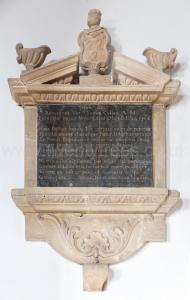
On or 24 Feb 1772 Petrus Johannes van Reysschoot (age 70) died.
On 24 Feb 1777 Joseph I King Portugal (age 62) died.
On 24 Feb 1788 Frederick Collings Lukis was born to Captain John Lukis (age 35) and Sarah Collings (age 39).
24 Feb 1821 John Keats (deceased) was buried at the Cimitero Acattolico, Rome. His last request was to be placed under a tombstone bearing no name or date, only the words, "Here lies One whose Name was writ in Water." His gravestone is inscribed with "This Grave contains all that was Mortal, of a YOUNG ENGLISH POET, Who, on his Death Bed, in the Bitterness of his Heart, at the Malicious Power of his Enemies, Desired these Words to be engraven on his Tomb Stone Here lies One Whose Name was writ in Water Feb 24th 1821.
Attribution: Howardhudson at English Wikipedia, CC BY 2.5
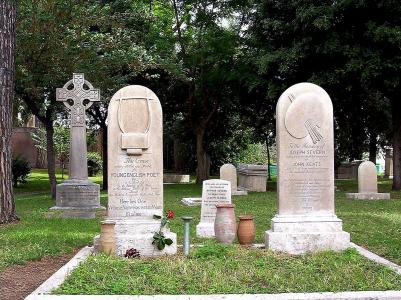
On 24 Feb 1821 Robert Needham Cust was born to Henry Cockayne-Cust (age 40) and Anna Maria Needham (age 31).
On 04 Jul 1829 Thomas Capron (age 81) died. On 24 Feb 1832 Elizabeth Lucas (age 80) died. Memorial in Church of St Rumbold, Stoke Doyle [Map] sculpted by Henry Hopper (age 62).
Thomas Capron: he and Elizabeth Lucas were married. Around 1748 he was born.
Elizabeth Lucas: Around 1752 she was born to John Lucas of Nortoft Manor.
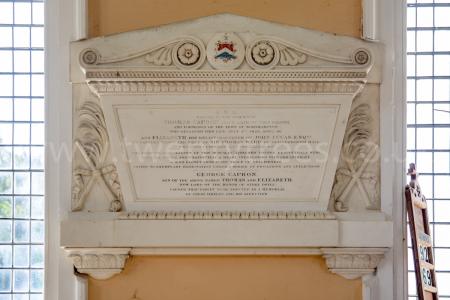
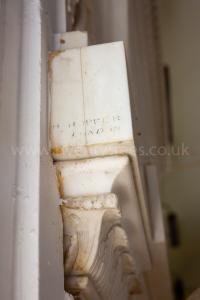
On 24 Feb 1884 William Owen Stanley (age 81) died. Monument in the Stanley Chapel, St Cybi's Church, Holyhead [Map] sculpted by William Hamo Thornycroft (age 33).
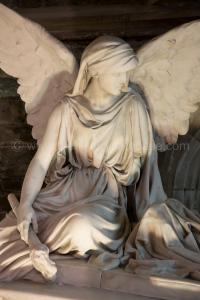
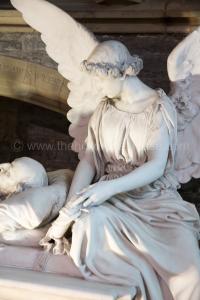
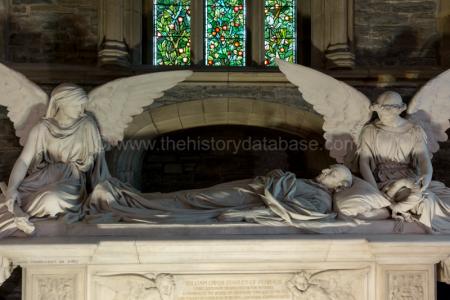
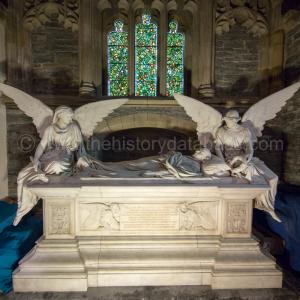
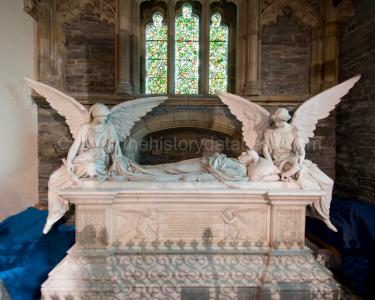
On 24 Feb 1911 Jules Joseph Lefebvre (age 74) died.
On 24 Feb 1980 Randle John Baker Wilbraham 7th Baronet (age 73) died. Memorial at All Saints Church, Old Rode. His son Richard Baker Wilbraham 8th Baronet (age 46) succeeded 8th Baronet Wilbraham of Loventor in Totnes in Devon.
Randle John Baker Wilbraham 7th Baronet: On 31 Mar 1906 he was born to Philip Wilbraham Baker Wilbraham 6th Baronet and Joyce Christabel Kennaway Lady Wilbraham. On 26 Feb 1930 Randle John Baker Wilbraham 7th Baronet and Betty Ann Torrens Lady Wilbraham were married.
Richard Baker Wilbraham 8th Baronet: On 05 Feb 1934 he was born to Randle John Baker Wilbraham 7th Baronet. On 26 May 2022 Richard Baker Wilbraham 8th Baronet died. His son Randle Baker Wilbraham 9th Baronet succeeded 9th Baronet Wilbraham of Loventor in Totnes in Devon.
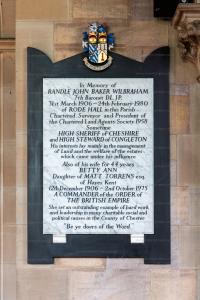
Births on the 24th February
On 21 or 24 Feb 1244 Louis Capet was born to King Louis IX of France (age 29) and Margaret Provence Queen Consort France (age 23). She a great x 2 granddaughter of King Henry "Curtmantle" II of England.

On 24 Feb 1347 Alberto Este Marquis of Ferrara was born to Obizzo Este III Marquis of Ferrara (age 52).
On 24 Feb 1404 Alice Deincourt 6th Baroness Deincourt, Baroness Lovel and Sudeley was born to John Deincourt 4th Baron Deincourt (age 21) and Joan Grey at Blankney, Lincolnshire.
On 24 Feb 1413 Louis Savoy I Count Savoy was born to Amadeus Savoy VIII Count Savoy (age 29) and Mary Valois Countess Savoy (age 26). Coefficient of inbreeding 3.44%. 
On 21 Feb 1499 Edmund Tudor 1st Duke of Somerset was born to King Henry VII of England and Ireland (age 42) and Elizabeth York Queen Consort England (age 33) at the Palace of Placentia, Greenwich [Map] being their sixth child. On 24 Feb 1499 he was christened at the Church of the Observant Friars, Greenwich [Map]. His godparents were Margaret Beaufort Countess Richmond (age 55), Edward Stafford 3rd Duke of Buckingham (age 21) and Bishop Richard Foxe (age 51), then Bishop of Durham. He is believed to have been was created 1st Duke Somerset on the same day although there is no documentation.


On 24 Feb 1500 Charles V Holy Roman Emperor was born to Philip "Handsome Fair" King Castile (age 21) and Joanna "The Mad" Trastámara Queen Castile (age 21) at Ghent [Map]. Coefficient of inbreeding 2.88%. 
On 24 Feb 1526 Afonso Aviz was born to John III King Portugal (age 23) and Catherine of Austria Queen Consort Portugal (age 19). Their first child, he died on 12 Apr 1526. Coefficient of inbreeding 11.30%. 
On 24 Feb 1528 Katharina Hohenzollern was born to Albert "The Elder" Hohenzollern I Duke Prussia (age 37) and Dorothea Oldenburg (age 23). She died the same day. Coefficient of inbreeding 1.98%. 
On 24 Feb 1535 Eléanor de Roucy de Roye Princess Condé was born.
On 24 Feb 1557 Matthias I Holy Roman Emperor was born to Maximilian Habsburg Spain II Holy Roman Emperor (age 29) and Maria of Spain Holy Roman Empress (age 28). Coefficient of inbreeding 10.03%.
On 24 Feb 1581 John Radclyffe of Ordsall was born to John Radclyffe of Ordsall Hall (age 45) at Ordsall Hall, Lancashire [Map].
On 24 Feb 1583 Margarete Oldenburg was born to John "Younger" Oldenburg Duke Schleswig Holstein Sonderburg (age 37) and Elisabeth of Brunswick-Grubenhagen (age 32).
Before 24 Feb 1588 Elizabeth Manners was born to John Manners 4th Earl of Rutland (age 37) and Elizabeth Charlton Countess Rutland (age 35).
Before 24 Feb 1588 Mary Manners was born to John Manners 4th Earl of Rutland (age 37) and Elizabeth Charlton Countess Rutland (age 35).
Before 24 Feb 1588 Edward Manners was born to John Manners 4th Earl of Rutland (age 37) and Elizabeth Charlton Countess Rutland (age 35).
Before 24 Feb 1588 Anne Manners was born to John Manners 4th Earl of Rutland (age 37) and Elizabeth Charlton Countess Rutland (age 35).
On 22 Oct 1588 Frances Manners Baroness Willoughby of Parham was born to John Manners 4th Earl of Rutland and Elizabeth Charlton Countess Rutland (age 35). She was born postumously; her father had died nine months previously on 24 Feb 1588.
On 24 Feb 1593 Henry de Vere 18th Earl of Oxford was born to Edward de Vere 17th Earl of Oxford (age 42) and Elizabeth Trentham Maid of Honour Countess of Oxford.
On 24 Feb 1603 Eleonore Sophie Oldenburg was born to John "Younger" Oldenburg Duke Schleswig Holstein Sonderburg (age 57) and Agnes Hedwig of Anhalt (age 29).
On 24 Feb 1619 Charles Le Brun was born.
On 24 Feb 1658 Richard Knightley was born to Lucius Knightley (age 34) and Elizabeth Dent (age 25) in Fawsley, Northamptonshire.
On 24 Feb 1660 John Murray 1st Duke Atholl was born to John Murray 1st Marquess Atholl (age 28) and Amelia Stanley Marchioness Atholl (age 27) at Knowsley Hall, Lancashire.


On 24 Feb 1666 Thomas Hales 2nd Baronet was born to Thomas Hales of Howletts.
Before 24 Feb 1673 Humphrey Edwin was born to Humphrey Edwin (age 31) and Elizabeth Sambrooke.
On 24 Feb 1675 Charles Hesse-Kassel was born to Charles I Landgrave Hesse-Kassel (age 20) and Maria Amalia of Courland Landgravine Hesse-Kassel (age 21). On 07 Dec 1677 Charles Hesse-Kassel (age 2) died. Coefficient of inbreeding 6.66%.
On 24 Feb 1678 Marie Anne Bourbon Condé Duchess Vendôme was born to Henri Jules Bourbon Condé Prince Condé (age 34) and Anne Henriette Palatinate Simmern (age 29). She a great x 2 granddaughter of King James I of England and Ireland and VI of Scotland.

On 24 Feb 1683 John Finch 6th Earl Winchilsea was born to Heneage Finch 3rd Earl Winchilsea (age 55) and Elizabeth Ayres Countess Winchelsea. He was christened on 06 Mar 1683 at Eastwell, Kent.
On 24 Feb 1712 Walter Aston 7th Baronet was born to Walter Aston (age 31).
On 24 Feb 1733 Thomas Townshend 1st Viscount Sydney was born to Thomas Townshend (age 31) and Albinia Selwyn at Raynham, Norfolk [Map].
On 24 Feb 1736 Charles Alexander Hohenzollern Margrave Brandenburg Ansbach was born to Charles William Frederick "The Wild Margrave" Hohenzollern (age 23) and Frederica Louise Hohenzollern (age 21). He a great grandson of King George I of Great Britain and Ireland.
On 24 Feb 1739 Rowland Winn 5th Baronet was born to Rowland Winn 4th Baronet (age 33) and Susanna Henshaw Lady Winn (age 29).
On 24 Feb 1743 Joseph Banks 1st Baronet was born to William Banks aka Hodgkinson (age 23).
On 24 Feb 1748 John Hampden-Trevor 3rd Viscount Hampden was born to Robert Hampden-Trevor 1st Viscount Hampden (age 42).
On 24 Feb 1749 Mary Bowes Countess Strathmore was born to George Bowes (age 47) and Mary Gilbert (age 40) at Upper Brook Street.
On 24 Feb 1752 Wilhelm Bottner was born.
On 24 Feb 1755 George Parker 4th Earl Macclesfield was born to Thomas Parker 3rd Earl Macclesfield (age 31) and Mary Heathcote Countess Macclesfield. Coefficient of inbreeding 6.25%. 
On 24 Feb 1756 Thomas Manners-Sutton 1st Baron Manners was born to George Manners-Sutton (age 32) and Diana Chaplin (age 25).

On 24 Feb 1761 Charles Hayter was born.
On 24 Feb 1774 Elizabeth Willoughby was born to James Willoughby (age 43).
On 24 Feb 1774 Adolphus Hanover 1st Duke Cambridge was born to King George III of Great Britain and Ireland (age 35) and Charlotte Mecklenburg Strelitz Queen Consort England (age 29).
On 24 Feb 1775 Edward Seymour 11th Duke of Somerset was born to Webb Seymour 10th Duke of Somerset (age 56) and Anne Maria Bonnell Duchess Somerset.
On 24 Feb 1788 Frederick Collings Lukis was born to Captain John Lukis (age 35) and Sarah Collings (age 39).
On 24 Feb 1790 Henry George Bathurst 4th Earl Bathurst was born to Henry Bathurst 3rd Earl Bathurst (age 27) and Georgiana Lennox Countess Bathurst (age 24) at Apsley House Hyde Park Corner. He a great x 3 grandson of King Charles II of England Scotland and Ireland.
On 24 Feb 1818 William Henry Orde-Powlett 3rd Baron Bolton was born to Thomas Powlett Orde-Powlett (age 31) and Letitia O'Brien.
On 24 Feb 1821 Robert Needham Cust was born to Henry Cockayne-Cust (age 40) and Anna Maria Needham (age 31).
On 24 Feb 1825 William Hozier 1st Baron Newlands was born.
On 24 Feb 1829 Eliza Amelia Gore Countess Erroll was born to Charles Stephen Gore (age 35) and Sarah Rachel Fraser (age 26) in Montreal.
On 24 Feb 1835 John Gilbert Talbot was born to John Chetwynd-Talbot (age 28) and Caroline Jane Stuart-Wortley (age 25).

On 24 Feb 1837 Algernon Freeman-Mitford 1st Baron Redesdale was born to Henry Reveley Mitford (age 33) and Georgiana Jemima Ashburnham (age 31).
On 24 Feb 1844 George Egerton-Warburton was born to Reverend James Francis Egerton-Warburton (age 36).
On 24 Feb 1864 Charles Joseph Thaddeus Dormer 14th Baron Dormer was born to James Charlemagne Dormer (age 30).
On 24 Feb 1871 Florence Cecilia Keppel Countess Cork was born to William Keppel 7th Earl Albermarle (age 38) and Sophia Mary MacNab of Dundurn Castle (age 38).
On 24 Feb 1880 Samuel Hoare 1st Viscount Templewood was born to Samuel Hoare 1st Baronet (age 38) and Katherine Louisa Hart Davis (age 34).
On 24 Feb 1885 Arthur Allan Stonhouse 17th and 14th Baronet was born to George Arthur Stonhouse-Vigor (age 37).
On 24 Feb 1901 Ralph Assheton 1st Baron Clitheroe was born to Ralph Cockayne Assheton 1st Baronet (age 40).
On 24 Feb 1910 Arthur Grey Hazlerigg 2nd Baron Hazlerigg was born to Arthur Grey Hazlerigg 1st Baron Hazlerigg (age 31).
On 24 Feb 1920 Ann Fortune Smith Duchess Grafton was born to Evan Cadogan Eric Smith (age 26).
On 24 Feb 1954 Constantine Phipps 5th Marquess of Normanby was born to Oswald Phipps 4th Marquess Normanby (age 41).
On 24 Feb 1967 William John Harry Esplen was born to John Graham Esplen 3rd Baronet (age 34).
Marriages on the 24th February
Before 24 Feb 1329 John Clinton 2nd Baron Clinton (age 29) and Margery Corbet (age 25) were married. He a great x 3 grandson of King Henry "Curtmantle" II of England. 
On 24 or 25 Feb 1382 Alexander "The Wolf of Badenoch" Stewart 3rd Earl Buchan (age 39) and Euphemia 6th Countess of Ross were married. He by marriage Earl Ross. She the daughter of William 5th Earl Ross. He the son of King Robert II of Scotland (age 65) and Elizabeth Mure Queen Consort Scotland. They were second cousin once removed. He a great x 4 grandson of King John "Lackland" of England. 
Befire 24 Feb 1404 John Deincourt 4th Baron Deincourt (age 21) and Joan Grey were married. They were fourth cousins.
Before 24 Feb 1408 John Tiptoft 1st Baron Tiptoft and Philippa Talbot (age 41) were married.

On 24 Feb 1415 James Tuchet 5th Baron Audley, 2nd Baron Tuchet (age 17) and Margaret Ros Baroness Audley Heighley were married. She by marriage Baroness Audley of Heighley in Staffordshire, Baroness Tuchet. They were half second cousin once removed. She a great x 4 granddaughter of King Henry III of England. 

On 24 Feb 1482 Gilbert Bourbon Count of Monpensier (age 39) and Clara Gonzaga (age 17) were married. The difference in their ages was 21 years.
On 24 Feb 1545 Wolfgang Count Palatine of Zweibrücken (age 18) and Anna of Hesse aka Cleves (age 15) were married. She the daughter of Landgrave Philip I of Hesse (age 40) and Christine of Saxony (age 39). They were half second cousins.
On 24 Feb 1555 Nicholas of Lorraine Duke of Mercœur (age 30) and Princess Joanna of Savoy Nemours (age 23) were married in Brussels [Map]. He the son of Antoine Lorraine II Duke Lorraine.
On 24 Feb 1555 Duke John Albert I of Mecklenburg-Schwerin (age 29) and Anna Sophia Hohenzollern (age 27) were married. She the daughter of Albert "The Elder" Hohenzollern I Duke Prussia (age 64) and Dorothea Oldenburg. They were second cousins.
On 24 Feb 1601 Richard Norton of South Creake in Norfolk and Barbara Pepys (age 25) were married.
On 24 Feb 1612 Robert Myddelton (age 49) and Eleanor Saltonstall were married.
On 24 Feb 1612 Edward Montagu 1st Baron Montagu (age 49) and Frances Cotton (age 34) were married at Weekley, Northamptonshire.
On 24 Feb 1680 John The Younger Evelyn (age 25) and Martha Spencer (age 21) were married. He the son of John Evelyn (age 59) and Mary Browne (age 45).

On 24 Feb 1699 Joseph I Holy Roman Emperor (age 20) and Wilhelmine Amalie of Brunswick (age 25) were married. He the son of Leopold Habsburg Spain I Holy Roman Emperor (age 58) and Eleonore Magdalene of Neuburg (age 44). She a great x 2 granddaughter of King James I of England and Ireland and VI of Scotland. 

On 24 Feb 1703 Hadley D'Oyly and Elizabeth Yallop were married at St Andrew's Church, Holborn [Map].
On 24 Feb 1713 James Stanhope 1st Earl Stanhope (age 40) and Lucy Pitt Countess Stanhope (age 21) were married.
On 24 Feb 1728 Edward Dering 5th Baronet (age 23) and Elizabeth Henshaw Lady Dering were married. She by marriage Lady Dering of Surrenden Dering in Kent.
On 24 Feb 1754 Colonel Frederick Creutzer (age 34) and Eliza Jacob were married.
On 24 Feb 1767 John Lyon 9th Earl Strathmore and Kinghorne (age 29) and Mary Bowes Countess Strathmore (age 18) were married. She by marriage Countess Strathmore and Kinghorne. He the son of Thomas Lyon 8th Earl Strathmore and Kinghorne and Jean Nicholson.
On 24 Feb 1772 Thomas Duncombe (age 47) and Anne Jennings-Clerke (age 22) were married. The difference in their ages was 25 years.
Before 24 Feb 1788 Captain John Lukis (age 35) and Sarah Collings (age 39) were married.
On 24 Feb 1800 Charles Constable aka Stanley (age 35) and Mary Macdonald were married.
On 24 Feb 1813 Thomas Somers-Cocks (age 33) and Agneta Cocks (age 18) were married. They were second cousin once removed.
Before 24 Feb 1818 Thomas Powlett Orde-Powlett (age 31) and Letitia O'Brien were married.
On 24 Feb 1823 Lieutenant-Colonel William Henry Meyrick (age 33) and Laura Vane (age 16) were married. She the daughter of William Henry Vane 1st Duke Cleveland (age 56) and Catharine Margaret Powlett Countess Darlington. They were half fourth cousins. He a great x 3 grandson of King Charles II of England Scotland and Ireland. She a great x 3 granddaughter of King Charles II of England Scotland and Ireland. 
On 24 Feb 1823 Henry Wilson 11th Baron Berners (age 26) and Mary Letitia Crump Baroness Berners (age 22) were married. They were first cousins.
Before 24 Feb 1837 Henry Reveley Mitford (age 33) and Georgiana Jemima Ashburnham (age 31) were married. She the daughter of George Ashburnham 3rd Earl Ashburnham and Charlotte Percy Countess Ashburham (age 61).
On 24 Feb 1837 Benjamin Lee Guiness 1st Baronet (age 38) and Elizabeth Guiness (age 23) were married. They were first cousins.
On 24 Feb 1840 Joseph Hardcastle (age 24) and Frances Lambirth (age 23) were married at St Paul's Church, Deptford.
On 24 Feb 1849 Thomas Bateson 1st Baron Deramore (age 29) and Caroline Rice-Trevor (age 20) were married. She a great x 5 granddaughter of King Charles II of England Scotland and Ireland.
On 24 Feb 1970 Timothy Tollemache 5th Baron Tollemache (age 30) and Alexandra Dorothy Jean Meynell were married.
Deaths on the 24th February
On 24 Feb 616 King Æthelberht of Kent (age 66) died. His son King Eadbald of Kent succeeded King of Kent. Emma Austrasia Queen Consort Kent by marriage Queen Consort Kent.
On 24 Feb 1191 John Montgomery I Count Alençon died at his Château d'Alençon. His son John Montgomery II Count Alençon succeeded II Count Alençon albeit he survived only three months.
On 24 Feb 1317 Philip Capet died.
On 24 Feb 1322 Richard Boteler of Marton (age 79) died.
Around 24 Feb 1345 Adam Welles 3rd Baron Welles (age 40) died. His son John Welles 4th Baron Welles (age 10) succeeded 4th Baron Welles.
On 24 Feb 1395 Jean I Viscount Rohan (age 71) died. His son Alan VIII Viscount Rohan (age 35) succeeded VIII Viscount Rohan. Béatrix de Clisson Countess Porhoët and Porhoët by marriage Viscountess Rohan.
On 24 Feb 1437 John Willoughby 7th Latimer of Corby (age 37) died. His son John Willoughby 8th Baron Latimer of Corby (age 16) de jure 8th Baron Latimer of Corby.
On 24 Feb 1483 Margaret Bourbon (age 44) died.
 On 24 Feb 1525 Richard Pole "White Rose" 5th Earl of Suffolk (age 45) was killed during the Battle of Pavia. Robert Stewart 4th Lord Aubigny (age 55) fought.
On 24 Feb 1525 Richard Pole "White Rose" 5th Earl of Suffolk (age 45) was killed during the Battle of Pavia. Robert Stewart 4th Lord Aubigny (age 55) fought.

Louis II de la Tremoille (age 64) was killed.
Unknown Painter. Battle of Pavia with the fallen Richard Pole "White Rose" 5th Earl of Suffolk (age 45) bottom left corner indicated by "Le Duc de Susfoc dit Blance Rose".
Robert Stewart 4th Lord Aubigny:
Robert Stewart 4th Lord Aubigny and Anne Stewart Lady Aubigny were married. She by marriage Lord Aubigny. He the son of John Stewart 1st Earl Lennox and Margaret Montgomerie Countess Lennox. They were second cousins. Robert Stewart 4th Lord Aubigny succeeded 4th Lord Aubigny.
Around 1470 he was born to John Stewart 1st Earl Lennox and Margaret Montgomerie Countess Lennox.
Around Apr 1544 Robert Stewart 4th Lord Aubigny died.
Robert Stewart 4th Lord Aubigny succeeded 4th Lord Aubigny.
Around 1470 he was born to John Stewart 1st Earl Lennox and Margaret Montgomerie Countess Lennox.
Around Apr 1544 Robert Stewart 4th Lord Aubigny died.
Louis II de la Tremoille: On 29 Sep 1460 he was born to Louis I de la Tremoille.
On 24 Feb 1563 Francis II Duke Guise (age 44) died having been wounded six days earlier by the Huguenot assassin Jean de Poltrot de Méré. His son Henry 1st Duke Guise (age 12) succeeded 1st Duke Guise.
On 24 Feb 1580 Henry Fitzalan 19th Earl of Arundel (age 67) died. His grandson Philip Howard 20th Earl of Arundel (age 22) succeeded 20th Earl Arundel Sussex, 10th Baron Maltravers, 10th Baron Arundel. Anne Dacre Countess Arundel (age 22) by marriage Countess Arundel Sussex.


On 24 Feb 1583 Anne Knightley died.
On 24 Feb 1586 Christopher Alleyn died.
On 24 Feb 1588 John Manners 4th Earl of Rutland (age 37) died. His son Roger Manners 5th Earl of Rutland (age 11) succeeded 5th Earl of Rutland.
On 24 Feb 1589 Giles Poole (age 73) died.
On 24 Feb 1601 William Carew (age 53) died.
In or before 1611 Vincent Harvie died. The date based on his wife's second marriage on 24 Feb 1612.
On 24 Feb 1632 Margaret Talbot (age 95) died. She was buried at St John the Baptist Church, Bromsgrove [Map] where she has an incription that reads "Here lyethe the body of Dame Margarete Lygon, daughter to the aforesaid Sir John Talbot, and sister to this dame Bridget Talbot that lieth here and wife to Sir Arnould Lygon of Beauchamp's Court, died February 24, 1632".
On 24 Feb 1633 Walter Butler 11th Earl Ormonde 4th Earl Ossory (age 74) died. His grandson James Butler 1st Duke Ormonde (age 22) succeeded 12th Earl Ormonde, 5th Earl Ossory. Elizabeth Preston Duchess Ormonde (age 17) by marriage Countess Ormonde.

On 24 Feb 1644 Frances Waldegrave Countess Portland (age 66) died.
On 24 Feb 1644 Anne Oldenburg (age 1) died.
On 24 Feb 1668 Thomas Adams 1st Baronet (age 82) died following a fall when getting out of his coach. His son William Adams 2nd Baronet (age 34) succeeded 2nd Baronet Adams of London.
On 24 Feb 1680 Thomas Haselrigge 3rd Baronet (age 55) died. His son Thomas Haselrigge 4th Baronet (age 16) succeeded 4th Baronet Haselrigge of Noseley Hall in Leicestershire.
On 24 Feb 1685 Henry Bedingfield 1st Baronet (age 70) died. His son Henry Bedingfield 2nd Baronet (age 49) succeeded 2nd Baronet Bedingfield of Oxburgh in Norfolk.
On 24 Feb 1685 Charles Howard 1st Earl Carlisle (age 56) died. He was buried at York Minster [Map]. His son Edward Howard 2nd Earl Carlisle (age 38) succeeded 2nd Earl Carlisle. Elizabeth Uvedale Countess Carlisle by marriage Countess Carlisle.
On 24 Feb 1688 Richard Astley 1st Baronet (age 63) died. He was buried at St Mary's Church, Patshull. His son John Astley 2nd Baronet (age 1) succeeded 2nd Baronet Astley of Patshull.
On 24 Feb 1711 Fulke Greville 6th Baron Brooke (age 18) died at University College, Oxford University. His brother William Greville 7th Baron Brooke (age 16) succeeded 7th Baron Brooke of Beauchamps Court in Warwickshire.
The 1715 Battle of Preston was the final action of the 1715 Jacobite Rebellion. It commenced on 09 Nov 1715 when Jacobite cavalry entered Preston, Lancashire [Map]. Royalist troops arrived in number over the next few days surrounding Preston forcing the Jaocbite surrender. 1463 were taken prisoner of which 463 were English. The Scottish prisoners included:
George Seton 5th Earl of Winton (age 37). The only prisoner to plead not guilty, sentenced to death, escaped from the Tower of London [Map] on 04 Aug 1716 around nine in the evening. Travelled to France then to Rome.
On 24 Feb 1716 William Gordon 6th Viscount Kenmure was beheaded on Tower Hill [Map].
On 09 Feb 1716 William Maxwell 5th Earl Nithsale was sentenced to be executed on 24 Feb 1716. The night before his wife (age 35) effected his escape from the Tower of London [Map] by exchanging his clothes with those of her maid. They travelled to Paris then to Rome where the court of James "Old Pretender" Stewart (age 26) was.


James Radclyffe 3rd Earl Derwentwater (age 25) was imprisoned in the Tower of London [Map]. He was examined by the Privy Council on 10 Jan 1716 and impeached on 19 Jan 1716. He pleaded guilty in the expectation of clemency. He was attainted and condemned to death. Attempts were made to procure his pardon. His wife Anna Maria Webb Countess Derwentwater (age 23), her sister Mary Webb Countess Waldegrave (age 20) [Note. Assumed to be her sister Mary], their aunt Anne Brudenell Duchess Richmond (age 44), Barbara Villiers 1st Duchess of Cleveland appealed to King George I of Great Britain and Ireland (age 54) in person without success.


On 24 Feb 1716 James Radclyffe 3rd Earl Derwentwater (age 25) was beheaded on Tower Hill [Map]. Earl Derwentwater, Baronet Radclyffe of Derwentwater in Cumberland forfeit.
William Murray 2nd Lord Nairne was tried on 09 Feb 1716 for treason, found guilty, attainted, and condemned to death. He survived long enough to benefit from the Indemnity Act of 1717.
General Thomas Forster of Adderstone (age 31) was attainted. He was imprisoned at Newgate Prison, London [Map] but escaped to France.
On 14 May 1716 Henry Oxburgh was hanged, drawn and quartered at Tyburn [Map]. He was buried at Church of St Gile's in the Fields. His head was spiked on Temple Bar.
The trials and sentences were overseen by the Lord High Steward William Cowper 1st Earl Cowper (age 50) for which he subsequently received his Earldom.
On 24 Feb 1718 Rachel Hungerford Viscountess Falkland (age 83) died at Bedgebury Manor, Goudhurst.
On 24 Feb 1719 William Robinson (age 44) died.
On 24 Feb 1721 John Sheffield 1st Duke of Buckingham and Normanby (age 72) died. His son Edmund Sheffield 2nd Duke of Buckingham and Normanby (age 5) succeeded 2nd Duke of Buckingham and Normanby, 4th Earl Mulgrave, 6th Baron Sheffield of Butterwick in Lincolnshire.
On 24 Feb 1725 John Pratt (age 68) died in Great Ormond Street Camden.
On 24 Feb 1728 Nathaniel Napier 3rd Baronet (age 60) died at Moor Crichel, Dorset. His son William Napier 4th Baronet (age 28) succeeded 4th Baronet Napier of Middle Marsh in Dorset.
On 24 Feb 1732 Colonel Francis Charteris (age 56) died.
On 24 Feb 1752 Captain Thomas Grey (age 23) was killed in a duel with George Farmer Lord Lempster at Marylebone Fields. George Farmer Lord Lempster was found guilty of manslaughter but appears to have received no punishment.
On or 24 Feb 1772 Petrus Johannes van Reysschoot (age 70) died.
On 24 Feb 1776 Elizabeth Hesketh Countess Derby (age 81) died.
On 24 Feb 1777 Joseph I King Portugal (age 62) died.
On 24 Feb 1785 John Dyke Acland 7th Baronet (age 62) died. His grandson John Dyke Acland 8th Baronet (age 7) succeeded 8th Baronet Acland of Columb John in Devon.
On 24 Feb 1800 Elizabeth Hamilton Countess Brooke Warwick Castle and Warwick (age 80) died.
On 24 Feb 1806 Edmund Pery 1st Viscount Pery (age 86) died.
On 24 Feb 1809 Horatio Walpole 1st Earl Orford (age 85) died. His son Horatio Walpole 2nd Earl Orford (age 56) succeeded 2nd Earl Orford, 3rd Baron Walpole of Wollerton.
On 24 Feb 1809 Henry Hopkins Fane Chomley (age 61) died at Exmouth, Devon.
On 24 Feb 1810 Henry Cavendish (age 78) died. He was buried at Sheffield Cathedral [Map].
On 24 Feb 1811 James Brudenell 5th Earl Cardigan (age 85) died at Grosvenor Square, Belgravia. His nephew Robert Brudenell 6th Earl Cardigan (age 41) succeeded 6th Earl Cardigan. Penelope Cooke Countess Cardigan (age 41) by marriage Countess Cardigan.
On 24 Feb 1812 Admiral Charles Cotton 5th Baronet (age 54) died. His son St Vincent Cotton (age 10) succeeded 6th Baronet Cotton of Landwade in Cambridgeshire.
On 24 Feb 1815 Margaret Emma Hamner Baroness Kenyon died.
On 24 Feb 1815 John Thorold 9th Baronet (age 80) died. His son John Hayford Thorold 10th Baronet (age 41) succeeded 10th Baronet Thorold of Marston in Lincolnshire. Mary Kent Lady Thorold by marriage Lady Thorold of Marston in Lincolnshire.
On 24 Feb 1816 John Lubbock 1st Baronet (age 71) died. His nephew John Lubbock 2nd Baronet (age 41) succeeded 2nd Baronet Lubbock of Lammas in Norfolk.
On 24 Feb 1822 Thomas Coutts (age 86) died and left his fortune, including his interest in Coutts Bank, to his wife Harriet Mellon Duchess St Albans (age 44).
On 04 Jul 1829 Thomas Capron (age 81) died. On 24 Feb 1832 Elizabeth Lucas (age 80) died. Memorial in Church of St Rumbold, Stoke Doyle [Map] sculpted by Henry Hopper (age 62).
Thomas Capron: he and Elizabeth Lucas were married. Around 1748 he was born.
Elizabeth Lucas: Around 1752 she was born to John Lucas of Nortoft Manor.


On 24 Feb 1832 Blanche Julia Leveson-Gower (age 1) died.
On 24 Feb 1845 Frederik Hesse-Kassel (age 73) died.
On 24 Feb 1851 Gerard Thomas Noel (age 68) died.
On 24 Feb 1853 Georgiana Gordon Duchess Bedford (age 71) died at Nice, France.
On 24 Feb 1854 Henry Peyton 2nd Baronet (age 74) died. His son Henry Peyton 3rd Baronet (age 49) succeeded 3rd Baronet Peyton of Doddington. Georgina Elizabeth Bethell-Codrington Lady Peyton (age 55) by marriage Lady Peyton of Doddington.
On 24 Feb 1866 Jeremiah Head (age 77) died.
On 24 Feb 1868 William Style (age 82) died.
On 24 Feb 1875 George Chapple Norton (age 74) died.
On 24 Feb 1878 William Lennox Bathurst 5th Earl Bathurst (age 87) died unmarried. His nephew Allen Bathurst 6th Earl Bathurst (age 45) succeeded 6th Earl Bathurst of Bathurst in Sussex, 6th Baron Bathurst.
On 24 Feb 1884 William Owen Stanley (age 81) died. Monument in the Stanley Chapel, St Cybi's Church, Holyhead [Map] sculpted by William Hamo Thornycroft (age 33).





On 24 Feb 1886 Leila Louisa Millicent Willoughby (age 30) died.
On 24 Feb 1888 James Johnstone of Alva (age 86) died.
On 24 Feb 1906 Walter William Brabazon Ponsonby 7th Earl Bessborough (age 84) died. His son Edward Ponsonby 8th Earl Bessborough (age 54) succeeded 8th Earl Bessborough. Blanche Vere Guest Countess Bessborough (age 59) by marriage Countess Bessborough.
On 24 Feb 1909 Sarah Cox aka Fanny Cornforth (age 74) died.
On 24 Feb 1909 Florence Sarah Wilhelmine Sheridan Baroness Poltimore died.
On 24 Feb 1911 Jules Joseph Lefebvre (age 74) died.
On 24 Feb 1916 Gertrude Duncombe (age 88) died.
On 24 Feb 1918 Bernard Eric Edward Barrington (age 70) died.
On 24 Feb 1922 Anne Lambton (age 52) died.
On 24 Feb 1922 Lewis Vernon-Harcourt 1st Viscount Harcourt (age 59) died. His son William Edward Harcourt 2nd Viscount Harcourt (age 13) succeeded 2nd Viscount Harcourt of Stanton Harcourt in Oxfordshire.
On 24 Feb 1924 Granville Ponsonby (age 69) died.
On 24 Feb 1929 Louisa Emma Antrobus died.
On 24 Feb 1931 Frederick Augustus II Grand Duke of Oldenburg (age 78) died.
On 24 Feb 1936 Anthony Francis Vincent 14th Baronet (age 41) died. His great uncle Frederick D'Abernon Vincent 15th Baronet (age 84) succeeded 15th Baronet Vincent of Stoke d'Abernon which title he held for one week before he died.
On 24 Feb 1938 Terence Plunket 6th Baron Plunket (age 38) and Dorothé Mabel Lewis (age 38) died in a plane crash. They were bound for the Hearst ranch at San Simeon, now known as Hearst Castle. In the coastal fog surrounding the airstrip on the ranch, the pilot overshot the field by nearly a mile and a half. One wing struck the ground, causing the plane to burst into flames and crash. James Lawrence was the only survivor, having been thrown clear of the plane. He suffered burns and a broken ankle. Her son Patrick Plunket 7th Baron Plunket (age 14) succeeded 7th Baron Plunket of Newtown in County Cork.
On 24 Feb 1950 Claud Heathcote-Willoughby-Drummond (age 77) died.
On 24 Feb 1952 Alianore Chandos-Pole Lady Lethbridge (age 83) died.
On 24 Feb 1959 Winefride Mary Elizabeth Feilding (age 90) died.
After 24 Feb 1960 Edith Maud Rawdon-Hastings 12th Countess Loudon (age 76) died. Her daughter Barbara Abney-Hastings 13th Countess of Loudoun (age 40) succeeded 13th Countess Loudon. Peter Griffiths Earl Loudon (age 35) by marriage Earl Loudon.
Baron Botreaux, Baron Stanley and Baron Hastings abeyant between her five daughters and their descendants.
On 24 Feb 1961 Lorna Catherine Curzon Countess Howe died.
On 24 Feb 1980 Randle John Baker Wilbraham 7th Baronet (age 73) died. Memorial at All Saints Church, Old Rode. His son Richard Baker Wilbraham 8th Baronet (age 46) succeeded 8th Baronet Wilbraham of Loventor in Totnes in Devon.
Randle John Baker Wilbraham 7th Baronet: On 31 Mar 1906 he was born to Philip Wilbraham Baker Wilbraham 6th Baronet and Joyce Christabel Kennaway Lady Wilbraham. On 26 Feb 1930 Randle John Baker Wilbraham 7th Baronet and Betty Ann Torrens Lady Wilbraham were married.
Richard Baker Wilbraham 8th Baronet: On 05 Feb 1934 he was born to Randle John Baker Wilbraham 7th Baronet. On 26 May 2022 Richard Baker Wilbraham 8th Baronet died. His son Randle Baker Wilbraham 9th Baronet succeeded 9th Baronet Wilbraham of Loventor in Totnes in Devon.

On 24 Feb 1996 Diana Mary Fynola Egerton Lady Fletcher (age 85) died.
On 24 Feb 2000 William Nicholas Somers Laurence Hyde Villiers (age 83) died.
On 24 Feb 2008 Davina Darcy 18th Baroness Darcy of Knayth (age 69) died. Her son Casper Ingrams 19th Baron Darcy of Knayth (age 46) succeeded 19th Baron Darcy of Knayth.